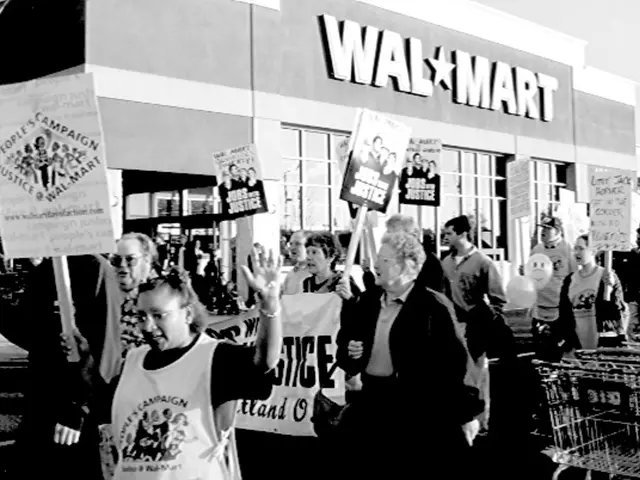Singapore's dominant political party poised for another resounding election win
In the bustling city-state of Singapore, the People's Action Party (PAP) once again proved their might as the preliminary vote counts showed a thrashing victory for an unbroken 14th straight election. It looks like the PAP is all set to extend their six-decade rule over Singapore, a nation they've governed since before its independence in 1965.
The election held on Saturday saw the PAP winning in all but three races across the 32 contested constituencies. Combining votes from the walkover seats they'd already won, the PAPclaimed victories in a staggering 87 out of the 97 parliamentary seats at play.
This election became a litmus test for the popularity of the PAP, and the opposition was under heavy scrutiny to challenge the PAP's grip on power and make further inroads after making small but unprecedented gains in the last election. The main opposition Workers' Party seems set to win 10 seats, matching their previous election count—the highest ever for any opposition party in Singapore.
The race was the PAP's first under the leadership of Lawrence Wong, now Singapore's fourth prime minister, who promised continuity, fresh blood, and self-guided leadership. He took over from the two-decade premiership of Lee Hsien Loong, the son of founding father Lee Kuan Yew. In many races, the PAP's winning margin was substantial, with only three of the contests neck-and-neck within the margin of error.
Irrespective of the result, a PAP defeat was always a long shot. The party has had an upper hand for years with a vast membership, sway over state institutions, and significantly more resources than its fledgling opponents. What energy there was for change had to wait for another day, as the PAP, once again, successfully steered the ship of state.
Now, with a "strong mandate" under his belt, Lawrence Wong faces tough challenges in navigating the city-state's economic waters amid global tensions over U.S. tariffs. Living costs and housing availability in one of the world's priciest cities will continue to top the agenda, presenting significant hurdles for Wong's government. The trading-dependent economy, threatened by becoming a casualty in trade wars, must be managed carefully to ensure economic stability.
As always, voter turnout in the election was high, with Singaporeans eagerly casting their ballots for the party they believe will best serve their interests. Their trust in the PAP has been unshaken despite the party's long history of critiques for curtailing dissent and stifling political pluralism.
The present victory marks a significant milestone for the PAP and sets the stage for Lawrence Wong's leadership moving forward. The opposition, though marginalized, will continue to advocate and strive for a more balanced political landscape. The struggle for a voice in Singapore's political discourse may be a long, uphill battle, but it is undoubtedly one worth fighting for.
With the 2025 election securing Prime Minister Lawrence Wong a landslide victory, the PAP looks poised for another six-decade run in power. However, the diminished but rejuvenated opposition seeks to strengthen its presence, intending to prove itself as an essential counterbalance to the PAP's dominance.
Incorporating some relevant insights from the enrichment data:
- The opposition made small but unprecedented gains in the last election: The main opposition Workers' Party won 10 seats in the 2020 election, reflecting a growing appetite for opposition voices and checks and balances.
- The PAP retains considerable influence with a large membership, sway over state institutions, and significant financial resources. The PAP uses tactics like cash handouts and vouchers to offset living costs as central components of their electoral strategy.
- Prime Minister Lawrence Wong and the PAP's victory ultimately reflects the populace's prioritization of economic stability over political pluralism. It demonstrates that the public values the PAP's steady hand despite their criticized suppression of dissent.
- Regardless of the opposition's efforts in the 2020 election, the People's Action Party (PAP) secured a staggering victory, capturing 87 out of 97 parliamentary seats, with promising continuity under their new leader, Lawrence Wong.
- With significant resources, influence over state institutions, and tactics like cash handouts and vouchers central to their electoral strategy, the PAP remained a dominant force in Singapore's politics, once again securing a six-decade rule.
- The impressive victory of the PAP, marked by a record high of 10 seats for the main opposition, the Workers' Party, is a reflection of the public prioritizing economic stability over political pluralism.
- Despite minimal gains by the opposition, the PAP's dominance has grown in the face of a dwindling but rejuvenated opposition, seeking to balance the power structure in Singapore.
- As the 2025 election approaches, the PAP, under Prime Minister Lawrence Wong, looks set to secure another landslide victory, establishing a continued presence in Singapore's policy-and-legislation sphere for the next six decades.







